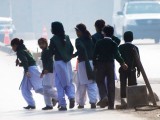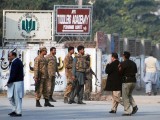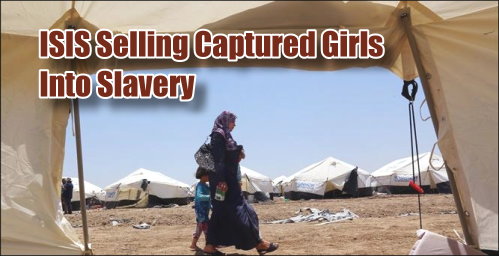Pakistan --The way I see it
Red Riding Wolf, the child abuser

Bisma Tirmizi
The author lives for the simple pleasures and her musings over a cup of tea almost always find a way to be the written word. She also writes for pakteahouse.net.
Red Riding Wolf
I once heard a storyteller say, it’s not about the story… for stories are all the same; it’s how you tell a story that makes it different. Today, we embark on the journey of telling you tales popularly heard and read as fairytales, folklore, plays, novels and poems and give you a new perspective on them – a little something to ponder upon.
We take a popular read and bridge it to our surroundings; we play on the nuances, the implied reality between the lines, the obvious being told and the vague that is suggested. The idea behind this concept is to adapt famous writings and link them to you and I, and the society we live in. We begin this fascinating journey with Red Riding Hood adapted as Red Riding Wolf and focus on the heinous reality that is child sex abuse.
_____________________________________________________________
Our neighbour’s little daughter was always in the lap, or was being carried around by their male servant.
Why?
Auntie – the little girl’s mother – was overtly religious; she covered her head and never missed imparting a religious lecture to the people she interacted with. She appeared aware of the misgivings in society; how was it that she saw no danger in the obvious, a child abuse incident waiting to happen?
Whatever happened to the little girl, I will never know, but it convinced me never to expose my unaware children to the possibility of a lurking wolf; and the assumption is that most parents do not hand their kids over to the desi male caretaker thinking that he will indulge in the heinous and wicked act of child abuse. But that is tantamount to the ostrich burying its head in the dirt thinking that the lurking wolf has disappeared.
No.
It exists – very subtle, yet loud.
I have never been an advocate of sleep-overs; an unaware, innocent child cannot be expected to look after his or her interest if left in the charge of a mal-intentioned adult. Society is perverse and if you are to look in the mirror and question the child, that was once you, the answer coming back may be ugly; yes, most have suffered minor exploitation at the hands of that someone who should never have been in charge, but sadly was.
Child abuse is rampant in our society, and I do not refer to the financially and literacy challenged segment of our communities, but the middle classes; upper and lower included. Our South Asian legacy and values have lulled us into believing that child molesters look a certain way, they can never be amongst the close associates, and only exist in the West. It is worth mentioning here that inappropriate touching of a minor, undressing and improper conversation with sexual undertone are all considered child abuse.
Young children are left in the care of male servants, extended family and distant cousins on the assumption that all is safe. Children are never educated about the dangers that exist within their circle, and they are certainly not encouraged to talk about the inappropriate behaviour they may have faced at the hands of a so-thought trusted adult.
What I allude to here is that most advantaged families play dumb to the existence of child abuse in their sphere of life. Is it that our patriarchal society is unwilling to accept the truth? In my observation, most decent men belonging to the middle classes are unwilling to accept this truth; the fathers, brothers, husbands, uncles and cousins all responded to my query perplexed; either they trust easy or are unwilling to re-educate themselves about the danger that unflinchingly looks them in the eye. Not surprisingly though, most women have an entirely different opinion on this issue.
I relocated to the US some years ago and noticed that the silent child abuse the children of Pakistan suffer is a not a very silent child abuse in the US, but despite the awareness, children suffer it every day; at the hands of the mother’s boyfriends, neighbours, family friends and in the garb of the menace called ‘the sleep over’.
Today, I sit down and write a little story – read it, ponder it, and maybe you’ll find yourself or someone you know in it.
Laal was domestic help, or a servant, as they are still referred to in Pakistan. He had worked in our household for generations and was never considered hired help; he was family. Many a child grew up in his nurturing but with the little girl’s childhood fondness of him also came the vague awareness that he was doing something wrong, subtly.
Not overtly, but his clever and indirect yet deliberate holding was different from the way other people held her. It was almost similar to that of the white bearded gentleman’s, the very same man she met at Hill Park every day. And then the bearded man disappeared, and years later came the revelation that his daughter-in-law caught him trying to get his dirty old ways with the 13-year-old aaya hired to play with his grandchildren.
Laal and the old gentleman were cut from the same cloth. One will never know what became of the aaya, but the little girl who was often left at Laal’s ward grew up to mistrust most men, even those who could be trusted. She, however, often finds herself sighing with relief at Laal’s almost decency; maybe his behaviour triggered the red signal in her growing awareness, or he himself put a stop to the antics, one will never know, but thankfully it never became an incident and only remained a very uncomfortable memory from her past.
The question that comes to mind is that was our parents’ generation unaware of the perversity that surely threads every society, generation and culture? The sexual undercurrent that children meet in the person of the bearded old man at the park, Laal or a sheep costumed stray wolf posing to be a family friend. How does it go un-sensed by the adult sensory radar of our traditional society? How and why?
Are we so proud and confident in our centuries-old South Asian values that we have willed ourselves into believing that our culture supersedes human perverseness? Do we not understand that human perverseness supersedes race, religion, gender, culture, colour and most importantly class. Many a sub-continental children of my generation quietly nod with me in unison and then look away.
 RSS Feed
RSS Feed Twitter
Twitter





































